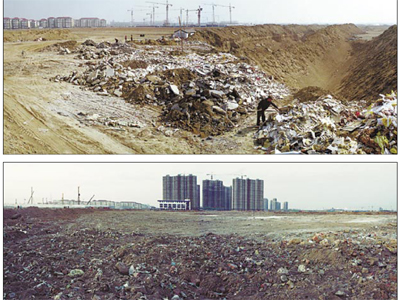 |
Large Medium Small |

About 130 of his thought-provoking photographs and some grand installations are now on show at Songzhuang Art Gallery.
The 33-year-old freelance photographer says he wanted to capture each dumpsite’s enormity, which was the reason why every exhibited photo consists of two connected pictures.
The connecting line is visible. While blurring the line out with software would have been simple, Wang said he did not want to use technology to change his images because people would then question the validity of his other photos from the garbage dumps.
Wang highlights class conflict by contrasting 2009 and 2010 images of the same areas, such as the economic technological development area in Tongzhou district where huge garbage-ridden area disappears in a year to be replaced by commercial buildings for city-dwellers.
Wang even captured garbage dumps on the site where an exposition will take place in 2013.
“I really look forward to people’s reactions once they know their exhibition site is built on top of garbage,” he said.
Physical proximity of two extremes — the gloss vs the gross — is also juxtaposed to stress the irony.
“From this awful dump, you can see, supposedly, ‘Asia’s widest building’,” Wang said while pointing at a photo of buildings near Chuyingshun township, at the border of Chaoyang and Tongzhou districts.
“At every dump I visited, there were fires burning away. Sometimes, garbage self-ignites, while other times people burn it,” Wang said.
According to him, only the big fires attract attention from firefighters.
Despite his passionate criticism of the current situation, Wang is not cynical. He says he wants to cooperate with local governments to help improve policies and environmental education.
Wang talked to officials from the Beijing People’s Political Consultative Conference in late June and they decided to publish his works.
Wang believes that working with the government is the “fastest way for change”.
He is not simply an environmentalist. He detests NGOs that ask people to live by “ascetic doctrines” or companies that promote their disposable products as being recyclable.
“We have to solve the problem at its root,” he said, meaning changing the culture of consumerism.
He mentions the example of a French hotel that provides no disposable products for their guests and that instead reuses everything.
“Their business was not affected,” Wang said. “We can do the same.”
In 2008, before Garbage Besieged, Wang was photographing special Guizhou funeral customs. He encountered many dumps around the graveyards and felt miserable even after finishing the trip.
“After reflecting for some time, I decided to take action,” Wang said. At the time, he was neither famous nor well-off and lacked sufficient funds for a lengthy mission to photograph the dumps.
With the help of fellow photographer Bao Kun, Wang successfully accomplished his project.
Wang rarely mentions the hardships he experienced during his trips.
“Obstacles? I’ve had lots,” he said. “But they are all in the past.”
Perhaps Wang’s first and upcoming documentary, which looks at how he made Garbage Besieged, will help people understand the arduous process.
Even when he describes the rancid dumps and breathing difficulties he had when visiting them, Wang does not complain about his personal challenges but about the environmental problems besieging the city.
He said he took few safety precautions when visiting the hazardous areas.
“I’m no better than the dumpster divers; if they can do it, I can do it.”
Wang has great respect for the dumpster divers he met on his excursions.
He embeds his hopes for equality in another series of photos, displayed on the second floor of the museum that focus on the people who congregate in and around the dumps.
“Other than our occupations, we are not different from them,” he said. “They share all the great qualities of mankind.”
In the photos, dumpster divers are not portrayed as desperate or pitiful subjects. In one photo, a child studies hard while another shows off a handstand. One group of grown-ups plays Mahjong while another hosts a 100-day celebration for their baby.
“Humanity is everywhere,” Wang said.